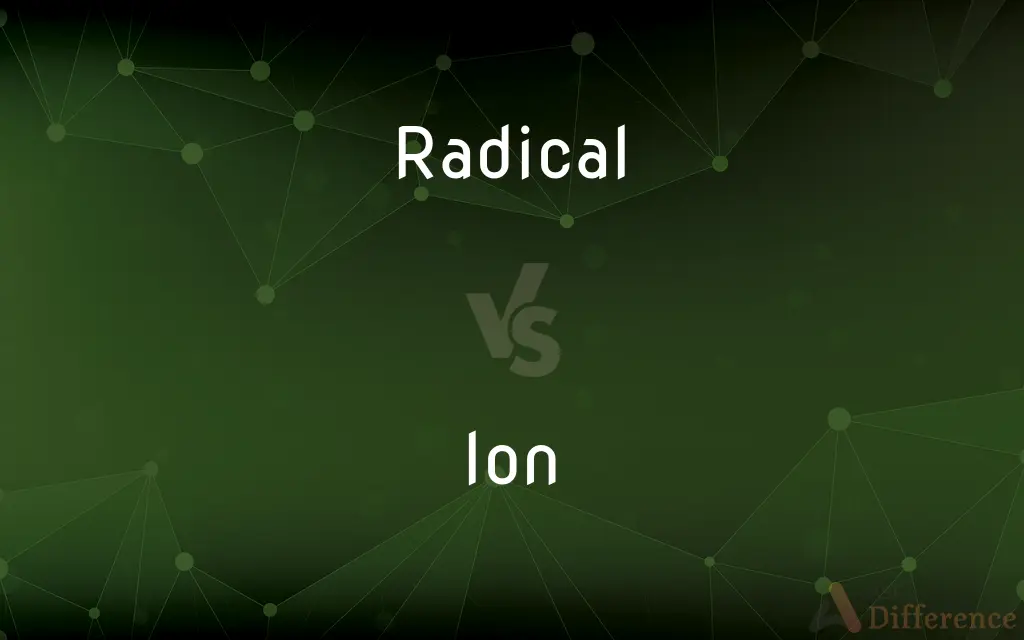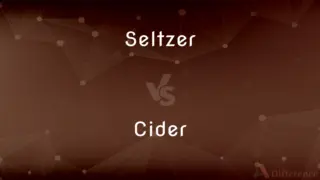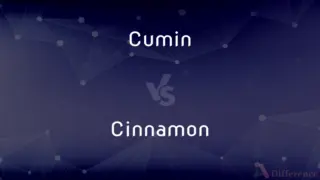Radical vs. Ion — What's the Difference?

Difference Between Radical and Ion
ADVERTISEMENT
Compare with Definitions
Radical
Arising from or going to a root or source; basic
Proposed a radical solution to the problem.
Ion
An ion () is a particle, atom or molecule with a net electrical charge. The charge of the electron is considered negative by convention.
Radical
Departing markedly from the usual or customary; extreme or drastic
A radical change in diet.
Ion
An atom or a group of atoms that has acquired a net electric charge by gaining or losing one or more electrons.
Radical
Relating to or advocating fundamental or revolutionary changes in current practices, conditions, or institutions
Radical politics.
A radical political theorist.
ADVERTISEMENT
Ion
An atom or group of atoms bearing an electrical charge, such as the sodium and chlorine atoms in a salt solution.
Radical
(Medicine) Relating to or being surgery that is extreme or drastic in an effort to eradicate all existing or potential disease
Radical hysterectomy.
Ion
An atom or goup of atoms (radical) carrying an electrical charge. It is contrasted with neutral atoms or molecules, and free radicals. Certain compounds, such as sodium chloride, are composed of complementary ions in the solid (crystalline) as well as in solution. Others, notably acids such as hydrogen chloride, may occur as neutral molecules in the pure liquid or gas forms, and ionize almost completely in dilute aqueous solutions. In solutions (as in water) ions are frequently bound non-covalently with the molecules of solvent, and in that case are said to be solvated. According to the electrolytic dissociation theory, the molecules of electrolytes are divided into ions by water and other solvents. An ion consists of one or more atoms and carries one unit charges of electricity, 3.4 x 10-10 electrostatic units, or a multiple of this. Those which are positively electrified (hydrogen and the metals) are called cations; negative ions (hydroxyl and acidic atoms or groups) are called anions.
Radical
(Linguistics) Of or being a root
A radical form.
Ion
One of the small electrified particles into which the molecules of a gas are broken up under the action of the electric current, of ultraviolet and certain other rays, and of high temperatures. To the properties and behavior of ions the phenomena of the electric discharge through rarefied gases and many other important effects are ascribed. At low pressures the negative ions appear to be electrons; the positive ions, atoms minus an electron. At ordinary pressures each ion seems to include also a number of attached molecules. Ions may be formed in a gas in various ways.
Radical
Of, relating to, or arising from a root
Radical hairs.
Ion
A particle that is electrically charged (positive or negative); an atom or molecule or group that has lost or gained one or more electrons
Radical
Arising from the base of a stem or from a below-ground stem or rhizome
Radical leaves.
Radical
(Slang) Excellent; wonderful.
Radical
One who advocates fundamental or revolutionary changes in current practices, conditions, or institutions
Radicals seeking to overthrow the social order.
Radical
(Mathematics) The root of a quantity as indicated by the radical sign.
Radical
Symbol R An atom or a group of atoms with one unpaired electron.
Radical
(Linguistics) See root1.
Radical
Any of the basic Chinese characters that are combined to form more complex characters.
Radical
Any of the traditional set of basic strokes or groups of strokes that make up Chinese characters and are used to classify and organize them in dictionaries.
Radical
Favoring fundamental change, or change at the root cause of a matter.
His beliefs are radical.
Radical
Pertaining to a root of a plant.
Radical
Pertaining to the basic or intrinsic nature of something.
Radical
Thoroughgoing; far-reaching.
The spread of the cancer required radical surgery, and the entire organ was removed.
Radical
Of or pertaining to the root of a word.
Radical
Produced using the root of the tongue.
Radical
Involving free radicals.
Radical
(math) Relating to a radix or mathematical root.
A radical quantity; a radical sign
Radical
Excellent; awesome.
That was a radical jump!
Radical
A member of the most progressive wing of the Liberal Party; someone favouring social reform (but generally stopping short of socialism).
Radical
A member of an influential, centrist political party favouring moderate social reform, a republican constitution, and secular politics.
Radical
A person with radical opinions.
Radical
(arithmetic) A root (of a number or quantity).
Radical
(linguistics) In logographic writing systems such as the Chinese writing system, the portion of a character (if any) that provides an indication of its meaning, as opposed to phonetic.
Radical
(linguistics)Celtic In Celtic languages, refers to the basic, underlying form of an initial consonant which can be further mutated under the Celtic initial consonant mutations.
Radical
(linguistics)Semitic linguistics In Semitic languages, any one of the set of consonants (typically three) that make up a root.
Radical
(chemistry) A group of atoms, joined by covalent bonds, that take part in reactions as a single unit.
Radical
(organic chemistry) A free radical.
Radical
Given an ideal I in a commutative ring R, another ideal, denoted Rad(I) or , such that an element x ∈ R is in Rad(I) if, for some positive integer n, xn ∈ I; equivalently, the intersection of all prime ideals containing I.
Radical
Given a ring R, an ideal containing elements of R that share a property considered, in some sense, "not good".
Radical
The intersection of maximal submodules of a given module.
Radical
(number theory) The product of the distinct prime factors of a given positive integer.
Radical
Of or pertaining to the root; proceeding directly from the root.
Radical
Hence: Of or pertaining to the root or origin; reaching to the center, to the foundation, to the ultimate sources, to the principles, or the like; original; fundamental; thorough-going; unsparing; extreme; as, radical evils; radical reform; a radical party.
The most determined exertions of that authority, against them, only showed their radical independence.
Radical
Belonging to, or proceeding from, the root of a plant; as, radical tubers or hairs.
Radical
Relating, or belonging, to the root, or ultimate source of derivation; as, a radical verbal form.
Radical
Of or pertaining to a radix or root; as, a radical quantity; a radical sign. See below.
Radical
A primitive word; a radix, root, or simple, underived, uncompounded word; an etymon.
The words we at present make use of, and understand only by common agreement, assume a new air and life in the understanding, when you trace them to their radicals, where you find every word strongly stamped with nature; full of energy, meaning, character, painting, and poetry.
Radical
One who advocates radical changes in government or social institutions, especially such changes as are intended to level class inequalities; - opposed to conservative.
In politics they [the Independents] were, to use the phrase of their own time, "Root-and-Branch men," or, to use the kindred phrase of our own, Radicals.
Radical
A characteristic, essential, and fundamental constituent of any compound; hence, sometimes, an atom.
As a general rule, the metallic atoms are basic radicals, while the nonmetallic atoms are acid radicals.
Radical
Specifically, a group of two or more atoms, not completely saturated, which are so linked that their union implies certain properties, and are conveniently regarded as playing the part of a single atom; a residue; - called also a compound radical. Cf. Residue.
Radical
(chemistry) two or more atoms bound together as a single unit and forming part of a molecule
Radical
An atom or group of atoms with at least one unpaired electron; in the body it is usually an oxygen molecule than has lost an electron and will stabilize itself by stealing an electron from a nearby molecule;
In the body free radicals are high-energy particles that ricochet wildly and damage cells
Radical
A person who has radical ideas or opinions
Radical
A character conveying the lexical meaning of a logogram
Radical
A sign placed in front of an expression to denote that a root is to be extracted
Radical
(linguistics) the form of a word after all affixes are removed;
Thematic vowels are part of the stem
Radical
(used of opinions and actions) far beyond the norm;
Extremist political views
Radical opinions on education
An ultra conservative
Radical
Markedly new or introducing radical change;
A revolutionary discovery
Radical political views
Radical
Arising from or going to the root;
A radical flaw in the plan
Radical
Of or relating to or constituting a linguistic root;
A radical verb form
Radical
Especially of leaves; located at the base of a plant or stem; especially arising directly from the root or rootstock or a root-like stem;
Basal placentation
Radical leaves
Share Your Discovery

Previous Comparison
Seltzer vs. Cider
Next Comparison
Cumin vs. Cinnamon













































